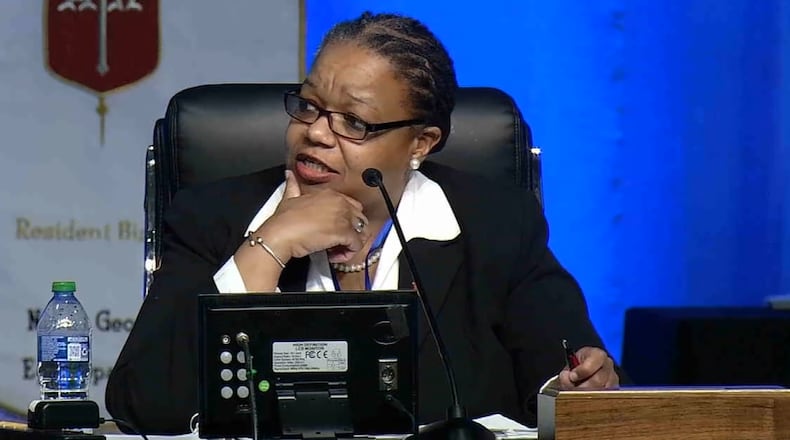The North Georgia Conference of the United Methodist Church voted Saturday to allow hundreds of its churches to split from the denomination due to an ideological divide over LGBTQ issues.
At a special called session in Athens, the conference ratified the disaffiliation requests, allowing those churches who want to leave the ability to go. The large group of churches have opted to exit the denomination after a major fracture over ordination of openly gay clergy and performance of same-sex marriage.
After the hours-long meeting of hundreds of members, 261 churches were approved to break from the United Methodist Church.
Bishop Robin Dease, episcopal leader of the North Georgia Conference, told attendees that she didn’t expect to be as emotional over the split given she assumed the leadership role in Jan. 2023.
“But I realized how sad this time is for so many, including myself,” she said. “I just hate that those who are leaving us, I will not have the opportunity to meet or to be with.”
Congregations that are leaving want to retain more traditional tenets of the denomination. Others are concerned that the denomination is becoming too progressive, or they fear changes over biblical interpretation.
On Saturday morning, one-by-one district superintendents took to the stage to name off the churches within their areas followed by lay leaders offering a prayer. Some described the day as “heartbreaking” while churches are “weary of conflict.” Others hoped “the split is the will of God and not of people.”
More than 1,500 members then voted in favor to “affirm the consent agenda to ratify the disaffiliation of churches.” Over 80% of members present approved the disaffiliation of 254 churches through an initial vote.
Eleven churches remained to be debated among all members. The discussions showed the depth of the divide down to the individual members of each congregation — some urged attendees to stop the disaffiliation process while others declared they had the right to part ways.
Of those 11, four churches had their requests for disaffiliation denied through a vote: Fountain Church UMC at Sugarloaf in Duluth; McEachern Memorial UMC in Powder Springs; Trinity UMC in Rome; and Griffin First UMC in Griffin.
After the split, the United Methodist Church expects around 440 remaining local churches in the region, according to a spokesperson, and intend to launch several new ministries in the North Georgia Conference.
Members against the exodus of their church often cited a lack of consensus on the issue from within their congregations or unfair disaffiliation processes. Others voiced concern about the religious hole disaffiliated churches would leave in communities — particularly areas with a large population of minority residents.
Attendees in favor of breaking off from the United Methodist Church said that the split was necessary for them to retain their religious missions. Even some who initially voted against disaffiliation in their local decision-making said that they should honor their churches’ wishes to leave, if that’s what they chose to do.
Credit: North Georgia Conference of the United Methodist Church
Credit: North Georgia Conference of the United Methodist Church
One church that saw particularly heavy debate was St. James United Methodist Church in Alpharetta. The congregation, established in 1867, has grown to 3,600 members, according to its website.
Rev. Dr. Gregory S. Williams, senior pastor at St. James, said that the church’s internal vote to disaffiliate was “honest.”
“Some of the churches have conveyed to me that if St. James leaves the city, it will create a Black desert,” he said. “Well, we will still be the church.”
Others disagreed.
“St. James is one of the largest and oldest historic black Methodist churches in Georgia,” said Angel Clark, a conference delegate and member of Impact Church in Atlanta. “Our world has become more diverse, and our annual conference should reflect the diversity of the world.
“Losing St. James will be a generational loss for our North Georgia Conference and across the UMC tradition in whole,” she said.
Another decision on disaffiliation came down to a single vote when attendees voted to approve Trinity United Methodist Church in Rome’s decision to split — 695 voted for while 694 voted against.
But the motion failed since church leadership stated it must win by a 50%-plus one majority. Fifty-one attendees refrained from the vote. Shouts of shock and anger rang throughout the conference center.
“We don’t know what the future will be, but Lord you do,” Rev. Nanci Hicks, pastor of Trinity said in prayer after the vote. “Help us to have the faith of our savior Jesus Christ, to believe in such a manner that we have peace in our hearts.”
In April, nearly 200 Georgia churches filed a lawsuit asking a judge to compel the United Methodist Church to allow them to part ways over the LGBTQ issues.
The suit, brought by churches in the North Georgia Conference of the UMC, was filed in Cobb County Superior Court. It followed another lawsuit in March asking for the same opportunity to disaffiliate.
Cobb County Superior Court Senior Judge J. Stephen Schuster ruled not long after that the dissatisfied churches could proceed with the process of allowing their members to vote on the split.
Churches who chose to split from the United Methodist Church denomination will have to fulfill certain financial obligations and depart with assets and property. Many that have previously disaffiliated have become independent or joined other Methodist denominations, including the more conservative Global Methodist Church.
— Staff reporter Shelia Poole contributed to this report.
About the Author
The Latest
Featured




